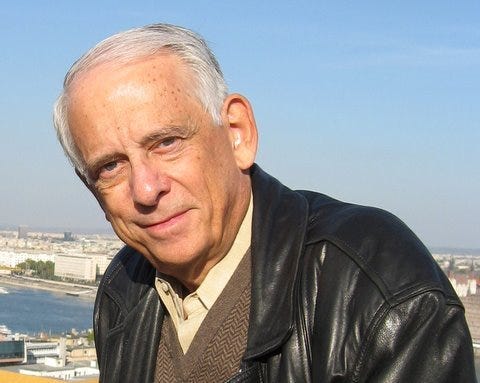Trump Blinks on Tariffs
Ignore the spin following President Trump’s tentative retreat from his ill-advised worldwide tariff and trade war.
The world’s major bond markets spoke forcefully. Sophisticated investors seemed uniformly unimpressed with the President’s clumsy use of tariffs to raise revenue and demonstrate his prowess as a market-savvy steward of the nation’s fisc.
The swift and rather uniform adverse reaction to his short-lived and extreme tariff policy roiled the bond and equity markets. As we go to press, investors were even dumping US treasuries in favor of German bonds. That’s worth pondering a bit. Some investors are embracing German bonds as a safe haven compared to current American treasuries, once the safest haven of all. “One factor people are speculating about on treasuries is the move away from the US dollar…of it becoming less trusted,” said Ken Egan, senior director for sovereigns at Kroll Bond Rating Agency. “If you follow that through, one way that could manifest is that structural holders of debt, reserve managers in China, could move away from American treasuries in response to policy moves from the U.S.”
Advancing American Freedom, a group founded by former Vice President Mike Pence, says its analysis estimates that President Trump’s planned tariffs would cost the average American family over $3500 a year.
The lesson for President Trump was or should have been, that he simply isn’t as astute and all-knowing as he thinks he is. He was playing with fire and came very close to getting burned, burning much of the trading world in the process. Whether the experience has chastened him remains to be seen.
The Conversation, a journal that publishes a compendium of articles by various economists, reports a consensus that Trump’s initial tariffs would have caused real consumption and employment in America to fall by 2.4% this year, and the country’s gross domestic product to have taken a 2.6% hit, and real investment (after inflation) would have plunged 6.6%.
The White House said it was backing off on the higher levies with which Trump had threatened our trading partners, but, almost as if to save face, the press advisory announced that the President would raise tariffs on goods from China to a whopping 145%. This makes little sense other than to show the world that Trump was still in charge and deftly playing a strong hand.
China, at first, chose to let Trump strut a bit, but China holds some powerful playing cards and has begun to play them. China, the second largest holder of American debt behind Japan, could shake the White House to the rafters if it were to start offloading some of its US debt. This is probably unlikely as it would have serious negative consequences for China, as the value of the debt it would continue to hold would diminish. China has, however, begun to retaliate by increasing tariffs on American goods to 125%.
The government of China and its banks own an estimated $ 3 trillion in American dollar-denominated assets. Those Chinese assets would decline precipitously if China started to offload. President Trump should think twice before poking the Chinese bear. “If the United States insists on substantively damaging China’s interests, China will firmly retaliate and fight to the end,” China warned in a statement released by China’s State Council. We could be on the brink of a tariff and trade war with China and possibly something much more serious.
As might be expected, the mood in the country seems to be souring. The University of Michigan Survey of Consumer Sentiment reports troubling news. The survey indicates that consumer sentiment sagged 11% in the past month, the fourth straight month in which the country's mood deteriorated. Public sentiment is falling, with consumers expressing serious concern about personal finances, income security, inflation, and labor markets. The survey reported the second-lowest level of consumer sentiment in 73 years. That’s serious and should be of concern to every American household. It is far from a ringing endorsement of President Trump’s stewardship. Trump’s 90-day hiatus on increasing most tariffs represents somewhat of a breather but still represents prolonged uncertainty, which the people and the markets abhor.
"The further fall in the University of Michigan Consumer Sentiment Index in April, along with the rise in both the one-and five-year inflation expectations, suggests that tariff-related fears that had soured sentiment over the past few months are here to stay,"
Economic uncertainty will remain as long as President Trump threatens financial stability. The country’s mood is not good, and that will affect all sorts of decisions people make. Because of the lingering tariffs, everything is about to get more expensive for American families. If President Trump raises tariffs further after the current 90-day hiatus expires, things will get very dicey.
All in all, we’re experiencing an exceedingly uncertain time. A war raging in Ukraine has produced over a million casualties. President Trump’s assurances that he could bring the war to a swift conclusion don’t seem to have impressed Vladimir Putin. Special envoy Steve Witkoff is concluding meetings with Putin as this column is being written. Perhaps we will have encouraging news. Perhaps not.
President Trump's initial tariff plans nearly fomented a serious financial crisis for the United States and much of the world. The leading trading nations fear President Trump for his recklessness far more than they respect him for his self-perceived prowess.
Please share our weekly commentary with others.
Of Thee I Sing 1776. Subscribe here:
https://oftheeising1776.substack.com/subscribe
Recent podcasts have featured my commentary on Liz Cheney’s book, “Oath and Honor,” as well as my commentaries regarding:
U.S. Representative Jim Jordan,
Brian Kemp and Those Republicans of Georgia,
The Trump Indictments,
The Fox Corp Settlement,
The CNN Trump Town Hall,
The Hunter Biden plea deal,
The New American Cult of Personality,
and my interviews with William Bratton, Retired Chief of Police in New York City, Los Angeles, and Boston;
Rikki Klieman, Attorney, Network News Analyst, and best-selling author;
John Thoresen, Executive Director, Barbara Sinatra Children’s Center;
Katherine Gehl, co-author of The Politics Industry and founder of the Institute for Political Innovation;
Jazz artist Ann Hampton Callaway;
Outlander author Diana Gabaldon;
AI Data Scientist Lawrence Kite;
Ryan Clancy, Chief Strategist of No Labels;
Former Senator Barbara Boxer;
Former Senator Joe Lieberman;
and former Maryland Governor Larry Hogan.
Novels by Hal Gershowitz





Keep the words coming. Clarity is forceful information.
Do you have anything good to say about our Country’s President? I’ve come to dread reading these negative Sunday musings. Just once I’d like to see you write something positive about our Country and its leadership . Happy Passover!